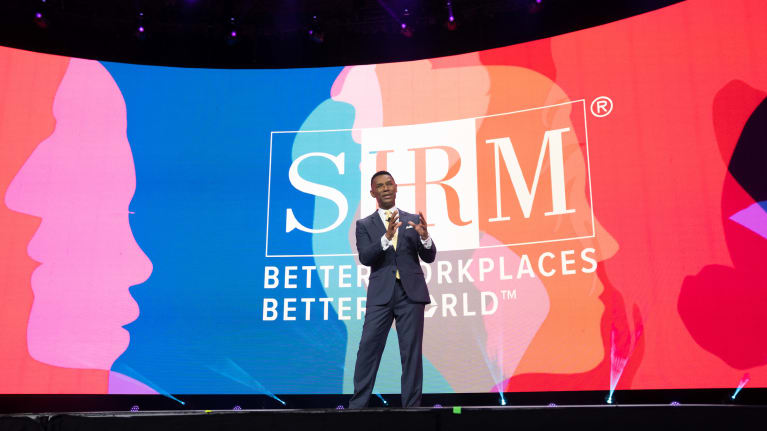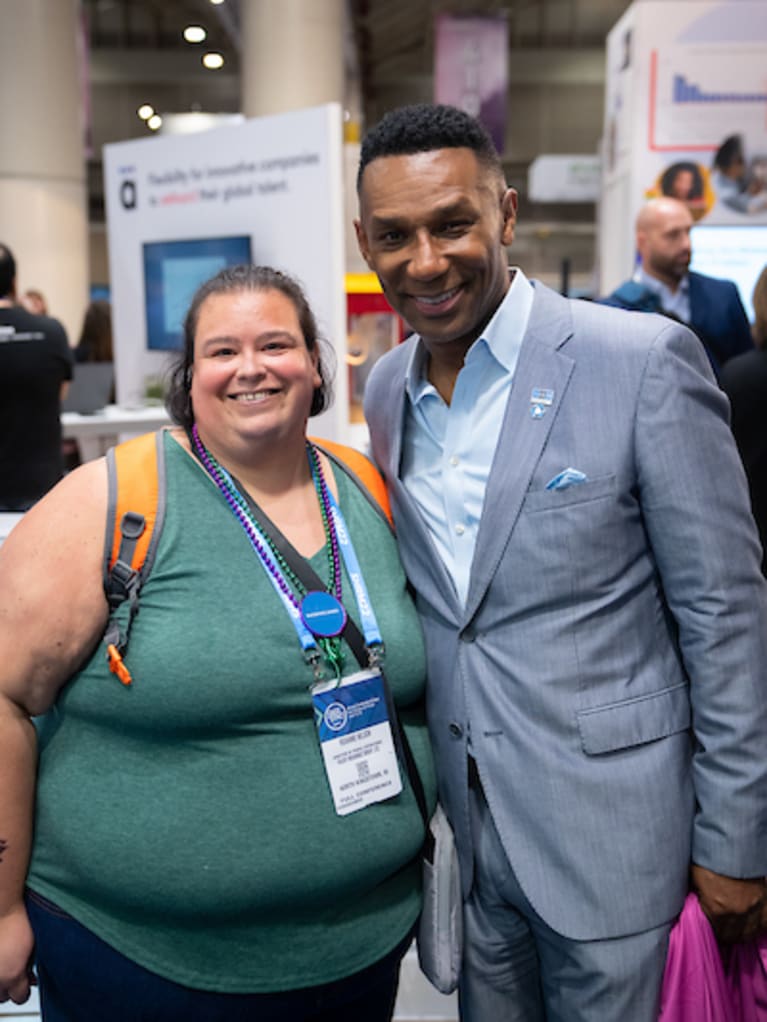
?When looking to truly Cause the Effect in their workplaces, HR professionals are well-equipped to do so by functioning more like thermostats than thermometers for their companies and employees.
The theme to the SHRM Annual Conference & Expo 2022 in New Orleans—Causing the Effect—was woven throughout the general session “Rise and Shine: HR’s Defining Moment Is Now!” Society for Human Resource Management (SHRM) President and Chief Executive Officer Johnny C. Taylor, Jr., SHRM-SCP, addressed more than 15,000 attendees live and online on June 13.
“When thinking about what HR can—and must—do with all of the power we have,” Taylor said, “I think of the biblical quote, ‘To whom much is given, much will be required.’ We have all been given the power to impact people’s lives for the better, and therefore we are obligated to act. COVID-19 presented a once-in-a-lifetime opportunity for the HR profession to show our value and to be valued.”
That goes for all 316,000 SHRM members globally.
Change Happening at Incredible Velocity
History shows that crises accelerate change, and the pandemic fits into that category, Taylor said.
“But never have we experienced change with so much velocity,” he said.
And while a thermometer can measure the state of things, it’s a thermostat that regulates it, creating that change. HR professionals must be the thermostats today and going forward, Taylor emphasized.
“We all must now feel the deep-seated urgency to drive change, rather than be driven by it,” Taylor said. “Because change accelerated exponentially over the last two years, [HR professionals] had to suit up every day, every minute, every second just to keep up. There was no time to think … or even blink. We were forced to replace the important with the urgent—because now, everything was urgent.”
Taylor addressed the full body of HR by exclaiming that even the smallest, seemingly trivial, administrative personnel work matters for employers and employees.
He shared that futurist Jason Silva, when recently asked, “What’s the new definition of billionaire?” responded that it’s someone who positively affects the lives of a billion people. Not make a billion dollars, mind you, Taylor said, but touch a billion lives. And HR has the opportunity to do so.
Rising from Receptionist to Director of People
 Taylor then put the spotlight on one attendee: Roxanne Nelson, director of people operations for Falvey Insurance Group, based in North Kingston, R.I., whom he had met the day before in the Expo hall.
Taylor then put the spotlight on one attendee: Roxanne Nelson, director of people operations for Falvey Insurance Group, based in North Kingston, R.I., whom he had met the day before in the Expo hall.
Nelson began her career at Falvey 22 years ago as a receptionist. She soon seized an opportunity to do entry-level work for the company’s HR department. Her drive led her up the department ladder, step by step, and about six weeks ago, she was named its director of people operations.
“I would never have been able to make that climb without the support of my company, my CEO and SHRM,” she told SHRM Conference Today after the general session. “I felt so proud to be mentioned by [Taylor]. It’s not something you can ever really prepare for, but it meant a lot.”
Mental Health: 1 in 4 Are Hurting Every Day
Taylor homed in on a particular issue that provides HR with “the quintessential opportunity” to act as a thermostat: mental health.
He challenged the audience, asking, “Is there an issue today more in need of thermostats than workplace mental health?”
The numbers bear it out: Nearly 1 in 4 workers say that they are feeling down, depressed or hopeless. And these sentiments are not sometimes, but often. Taylor even suggested that those survey numbers could be underreported.
“Because of the stigma still associated with mental health, people aren’t always fully forthcoming when responding to surveys, to their families, to their co-workers or to themselves.
“HR leaders must listen well. And in HR, ‘listening’ is done with your eyes and your ears. We oftentimes have to observe our employees to hear what they’re saying as well as what they are not saying,” Taylor said.
Beyond listening, HR professionals can drive change in their workplaces by advocating for changes to benefits and support for mental health. For example, more than one-third of workers report they would choose mental health benefits over higher pay, yet fewer than one-third of HR professionals say that offering mental health resources is a high priority for their organizations, according to SHRM’s Mental Health in America: A 2022 Workplace Report.
“When you think that many of your employees place higher value on mental health benefits over higher pay, this isn’t to be interpreted as just a data point—it’s a cry for help. Let’s help them,” Taylor said.
If people were machines, HR’s job would be easy, he added, because if a machine breaks down, it’s either fixed or replaced.
“But people aren’t machines,” Taylor said. “And we aren’t in the machine resources business. Human beings are fallible, imperfect and are often prone to bad judgment or poor decision-making. But with all that, people are also our greatest resource—the greatest computer ever made.”
Culture Prevents Workers from Heading for the Exits
Taylor then turned to company culture.
“Many people derive their identity from the work they do, where they do it and whom they serve,” he said. The pandemic allowed workers to re-evaluate what they really want from their workplaces and their employers, and many headed for the exit.
“Workers today are demanding more from their work and their lives. Many were suffering through not just a medical crisis or a financial crisis, but a crisis of identity, purpose, value, validation,” Taylor said. “They’re not just asking, ‘What am I doing, where am I doing it and for whom am I doing it?’ but ‘Why am I doing it at all?’
“They are demanding a rewrite of the outdated social contract between employer and employee, sparking an unprecedented talent crisis. The good news is crisis always gives our organizations a chance to re-examine their culture, their identity, both internally and externally,” he said.
Taylor said this will happen when we take responsibility for building inclusive, empathetic and resilient cultures that highlight agility, adaptability and alignment. “This will require thinking differently by us, the HR profession. Our success as HR professionals comes from building unity out of diversity, and that requires thinking like a thermostat, not a thermometer, right from the start,” he said.
Credentialed Employees Thrive
Last, Taylor told the audience about the value of credentials—now more than ever.
When the SHRM Foundation surveyed executives, managers and HR professionals on their views about alternative credentials (such as training certificates and industry certifications), 50 percent of executives placed a high value on them when making hiring decisions for open positions.
“Yet, only 15 percent of HR professionals felt the same,” he said. “That 35-point difference between how HR perceives alternative credentials and how business executives perceive them is a problem.”
Lisa Furlong, SHRM-SCP, human resources manager for Eternal World Television Network in Washington, D.C., said of the general session, “It was great to hear how COVID-19 really shed light on what we do as HR professionals and that others learned our roles. [Because of the situation], many more employees and management reached out to us and coming to see HR was no longer looked at like you had to go to the principal’s office.”
Kimberly Lee, senior director of organizational strategy and development at PowerSchool in Folsom, Calif., added, “It was interesting to learn about what employees value in terms of mental health benefits and what executives are doing about it. The fact that employees are more wanting these benefits over higher pay was interesting. Also, it felt good to hear that we’re not in the machine relations business, we’re in the human aspect of it—with everything we do.”
Frank Mota, director of human resources at Microfabrica in Van Nuys, Calif., said, “This new definition of billionaire is impactful because it’s more about helping others than having more money.”
